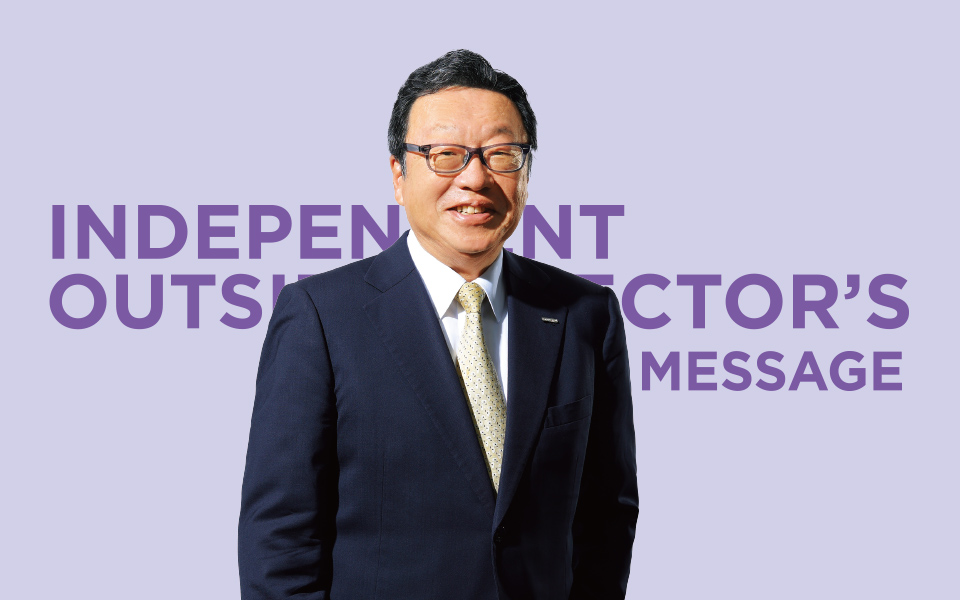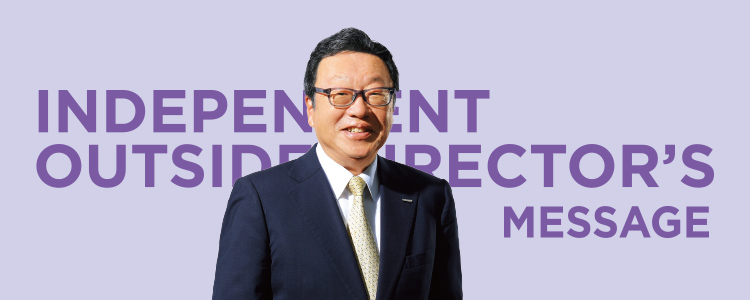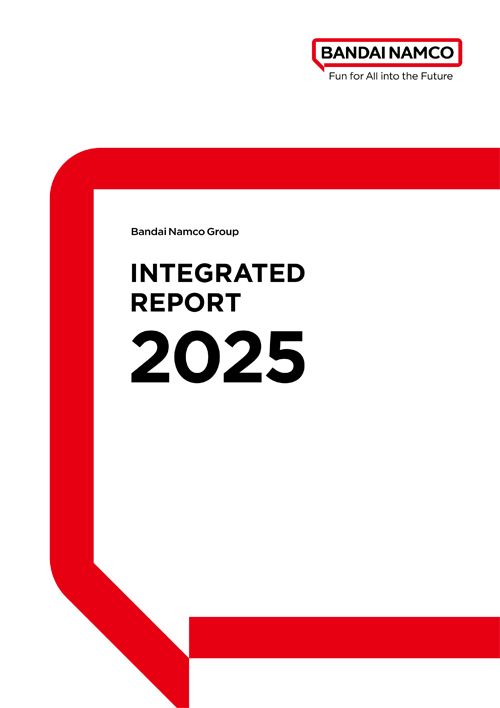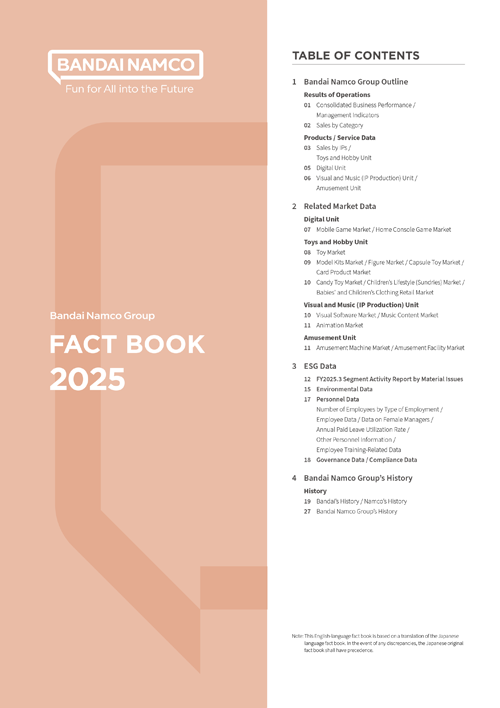

 INDEPENDENT OUTSIDE DIRECTOR’S MESSAGE
INDEPENDENT OUTSIDE DIRECTOR’S MESSAGE
management from medium-term
and long-term perspectives,
I will help to further
evolve the Group’s governance
Bandai Namco Holdings Inc.
 Reflecting on Over 10 Years of Evaluations of the Effectiveness of the Board of Directors
Reflecting on Over 10 Years of Evaluations of the Effectiveness of the Board of Directors
We have made revisions to the process for evaluating the effectiveness of the Board of Directors nearly every year since commencing these evaluations in 2015. In FY2025.3, we added “Engagement with shareholders and employees” as a new item in the evaluation survey and made adjustments to the peer evaluations of individual director performance to elicit more candid feedback. We also included the operation of Vision Meetings and executive off-site meetings in the scope of evaluation. At the same time, we revised the post-evaluation process to involve joint discussions between internal and outside directors, rather than simply having the Independent Directors Committee submit proposals to the executive side.
In general, the Board of Directors Secretariat provides support in an appropriate manner, sufficiently providing the outside directors with the information that they need. However, there is room for improvement in terms of the voluntary provision of information that could provide hints for ascertaining the sentiment and engagement level of stakeholders. There is a tendency for evaluation scores to be higher when performance is solid, so it is important not to become overconfident in the scores. By engaging with various types of real-world information, I hope to deepen my understanding of management issues and uncover potential blind spots in the Group’s strategies.
 Promoting a Hybrid Model for Group Governance
Promoting a Hybrid Model for Group Governance
The Board of Directors operates under a hybrid model that places emphasis on monitoring while also possessing management features. In particular, the direct participation of representative directors from the business management companies on the Board of Directors demonstrates the Group’s approach to governance based on individual strategies. This approach provides significant advantages for promoting businesses that engage closely with fans. However, the current Board composition can make it difficult to allocate sufficient time to discuss capital strategies and long-term issues. To address this, we have set up Vision Meetings and executive off-site meetings to serve as forums for such discussions. In the round of Board appointments in FY2026.3, we added one internal director with a view toward strengthening our management foundation over the medium to long term. While this move may appear at first glance to be a step backward in the broader trend of governance reform, I believe that, under our current governance structure, said addition helps realize an optimal composition for reinforcing our corporate foundation.
The Personnel Committee has been heavily involved in these Board appointments. The role of the committee is not to narrow down a list of candidates and make nominations itself but rather to determine whether the candidate proposals made by the executive side are appropriate. An important part of this determination is ensuring that there is an alignment between the reasons for the executive side’s proposals and the direction of our medium- to long-term strategies. This is very important because it is difficult for outside directors to fully assess a candidate’s capabilities and character based only on the brief opportunities we have to conduct interviews. There are existing frameworks that can be leveraged to help outside directors in this regard, such as the regular meetings that are held with executives from Group companies. In addition, we see promise in the fundamental expansion of our skills matrix so that it can be better applied in executive appointments, and we will continue to examine this idea going forward.
 Considering Medium-Term and Long-Term Perspectives
Considering Medium-Term and Long-Term Perspectives
Among the various initiatives outlined in the current Mid-term Plan, those pertaining to capital policy, capital allocation, and shareholder returns strongly reflect the concerns and perspectives of outside directors and the corporate side. In contrast, many of our business strategies were drafted by individual business Units and finalized through a process in which we provided various feedback and raised concerns. Moving forward, we will enter a phase in which we closely monitor the progress of these strategies and initiatives, taking into account geopolitical factors and market changes in tandem with 360 investments led by the CW360 Division, which are executed from a Groupwide, medium- to long-term perspective.
Just as our current medium-term strategies are based on a vision of what the Group should look like in 2030, a key theme in formulating the next Mid-term Plan (beginning April 2028) will be how we envision the Group in 2035. When considering the relationship between short- to medium-term initiatives and long-term direction, there are generally two approaches: an approach in which the long-term direction is examined based on the track record of shorter-term initiatives and an approach, in which short- to medium-term initiatives are formulated by backcasting from a long-term vision. While an inductive approach has underpinned the Group’s rapid growth in recent years, a deductive approach is also important when considering issues that impact sustainable business growth over the long term. With that said, to adopt a deductive approach, it is imperative to recognize the necessity of a long-term vision and to foster genuine motivation to reach that vision. The first step in this process is to build a foundation for discussions on long-term direction so that we can deepen the potential of our efforts to formulate a clear vision.
 Promoting Further Dialogues with Capital Markets
Promoting Further Dialogues with Capital Markets
The direction of the Group’s governance reform, which focuses on strengthening our corporate foundation, is appropriate, in principle. At the same time, we must exercise the utmost care in implementing these reforms to ensure that they are properly understood internally and that they do not constrain business operations but rather enhance their flexibility.
Also, the current Mid-term Plan places emphasis on our stance on dialogues with capital markets. Personally, I have been holding meetings with individual investors in which I listen sincerely to their feedback while encouraging the open and candid exchange of opinions. Furthermore, at venues such as Board meetings, I act as a proxy for shareholders by raising questions to the executive side and encouraging them to come up with ideas that better reflect shareholder interests. Striking a balance between maintaining Bandai Namco’s uniqueness and meeting the needs of the market is no easy task. However, I am committed to helping the Group further evolve its governance so that it can achieve this balance in the best way possible.




 CHAIRMAN’S MESSAGE/PRESIDENT’S MESSAGE
CHAIRMAN’S MESSAGE/PRESIDENT’S MESSAGE Integrated Report 2025
Integrated Report 2025 16.8 MB
16.8 MB MAJOR IPS IN GROUP PRODUCTS AND SERVICES
MAJOR IPS IN GROUP PRODUCTS AND SERVICES